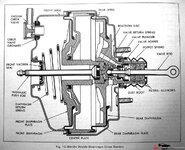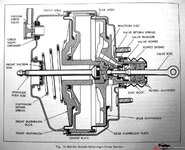kwplot34
Heart Attack
None of my vehicles with Vac brakes travel to the floor. In fact the HB brakes on the diesel travel further than the Vac brakes.
None of my vehicles with Vac brakes travel to the floor. In fact the HB brakes on the diesel travel further than the Vac brakes.
What I was trying to do with this thread is to show that non assisted brakes using new material like Willwood brakes and master would be a great option for our cars...
I know the original system of the car could be good enough for street use and is used by a lot.
I am certainly considering it.
But I want to upgrade it and make it safer too at the same time,
While I'm at it...
I would like to get rid of the booster and go manual brakes. Cleans up the firewall and it works just fine. Had many a car's with manual brakes,and my old truck has manual brakes.
What I was trying to do with this thread is to show that non assisted brakes using new material like Willwood brakes and master would be a great option for our cars...
I know the original system of the car could be good enough for street use and is used by a lot.
I am certainly considering it.
But I want to upgrade it and make it safer too at the same time,
While I'm at it...
I would like to get rid of the booster and go manual brakes. Cleans up the firewall and it works just fine. Had many a car's with manual brakes,and my old truck has manual brakes.
Would you mind explaining that, naively I don't see how boosting the brakeand would make the the pressure balancing better.A big reason for cars switching from mechanicals to hydraulics was to keep the brakes balanced so there would be equal pressure on all wheels, almost impossible to maintain with mechanicals.
and everyone hates me for it, but HydroBoost solved the issues, pedal travel maybe 1/2 and hard as a brick....my foot modulates the brakes not some sucky vacuum system......
:smash:
If you want to have truck brakes on a sports car, power to ya.
The Blue Devil has vacuum assist.
The ZO-6 has vacuum assist.
No Corvette EVER came from the factory with truck brakes.
I have locked my stock vacuum assist brakes up at 100 MPH, and slid straight as an arrow.
I hate to think what would have happened with ONE TON DUALLY BRAKES.
But, it's a free country.
What I was trying to do with this thread is to show that non assisted brakes using new material like Willwood brakes and master would be a great option for our cars...
I know the original system of the car could be good enough for street use and is used by a lot.
I am certainly considering it.
But I want to upgrade it and make it safer too at the same time,
While I'm at it...
What I was trying to do with this thread is to show that non assisted brakes using new material like Willwood brakes and master would be a great option for our cars...
I know the original system of the car could be good enough for street use and is used by a lot.
I am certainly considering it.
But I want to upgrade it and make it safer too at the same time,
While I'm at it...
The calipers perform the same, no matter how you assist them, hydraulic, pneumatic, nothing, a flux capacitor..... it is simply pressure inside the caliper times piston area..... simple physics....
non assisted brakes work just as good as anything, you just have to push the pedal harder.....
Would you mind explaining that, naively I don't see how boosting the brakeand would make the the pressure balancing better.A big reason for cars switching from mechanicals to hydraulics was to keep the brakes balanced so there would be equal pressure on all wheels, almost impossible to maintain with mechanicals.
Would you mind explaining that, naively I don't see how boosting the brakeand would make the the pressure balancing better.A big reason for cars switching from mechanicals to hydraulics was to keep the brakes balanced so there would be equal pressure on all wheels, almost impossible to maintain with mechanicals.
It's not the assist, it's the hydraulic fluid system which is self balancing & adjusting as opposed to mechanical levers & rods which wear causing uneven braking on the different wheels.
What everyone conveniently ignores is the fact that our stock sucky boosters have a spring between the input shaft to the pedal, and the output shaft to the m/cyl.....that spring is a problem child that allows way over excessive pedal travel, ...................
:banghead::gurney:

Would you mind explaining that, naively I don't see how boosting the brakeand would make the the pressure balancing better.A big reason for cars switching from mechanicals to hydraulics was to keep the brakes balanced so there would be equal pressure on all wheels, almost impossible to maintain with mechanicals.
It's not the assist, it's the hydraulic fluid system which is self balancing & adjusting as opposed to mechanical levers & rods which wear causing uneven braking on the different wheels.
What everyone conveniently ignores is the fact that our stock sucky boosters have a spring between the input shaft to the pedal, and the output shaft to the m/cyl.....that spring is a problem child that allows way over excessive pedal travel, ...................
:banghead::gurney:
Here is a Corvette booster. I can't find the spring that would cause lost motion. Maybe the valve return spring? I can't see that causing more than 1/8

I just remembered that I have used the HB system to slow my corvette down for a number of years.
When it was on the trailer being towed by my chevy van..
I have owned several diesel trucks over the years. And they all had HB brakes. I don't like them. I think the vac brakes work better and feel better.
